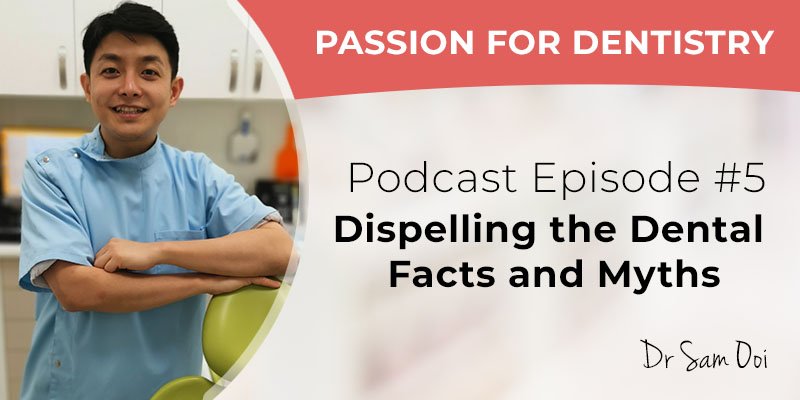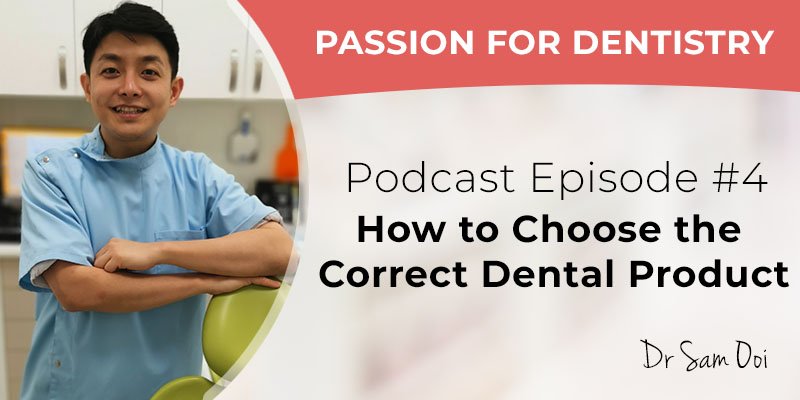Podcast Episode #5: Dispelling the Dental Facts and Myths
Subscribe Here:

Dispelling the Dental Facts and Myths
Podcast Transcript
My name is Melody and joining me in this chat is Dr Sam Ooi, the principal dentist and owner of Passion Family Dental North Lakes. Hi Sam!
Sam: Hi, everyone!
Melody: In today’s podcast we wanted to chat about some of the myths we hear regarding dentistry and give you the facts, and hopefully dispel some of your fears.
Sam: So many people worry about being poisoned by their amalgam fillings and the fluoride in the water.
Melody: When really there is no need. In saying that, this is just our professional opinion, everyone has their own thoughts on some of the topics we will discuss today and we respect others opinions.
We hear stories of people thinking that their amalgam fillings will cause all sorts of diseases and even give them cancer, they then go to the expense of having these fillings removed. The fact is that yes, amalgam fillings do contain mercury. The mercury is mixed with tin, silver, copper and other trace metals.
When the filing is first placed in the tooth it is still very soft and malleable so that the dentist can press and shape it into the prepared space in the tooth, over the next couple of hours the filling hardens and gains strength.
Once the filling is set, or fully hardened, the mercury cannot ‘leak’ as many people think it can. It is now part of the metal alloy and is a solid mass. Solids can’t ‘leak’.
Most dentists don’t place amalgam fillings anymore because there are now better products available, but back in the day when amalgam fillings were common, they were the best filling material we had. I think the fact that so many of us still have the same amalgam fillings that were placed when we were kids is testament to their strength.
The problem we do find with amalgam fillings is that they can, over time, cause our teeth to crack. Just like any other metal, amalgam contracts and expands with hot and cold, therefore as we eat hot and cold food and drinks, our amalgam filling will expand and contract.
This puts pressure on the remaining tooth structure and can eventually cause the tooth to develop a crack and potentially beak off.
Sam: The problems with cracks in the tooth is that it is difficult to guess the depth of the crack or the direction it may take.
Melody: They are just like a crack on your windscreen, you never know if the crack will stay just as it is or if it will crack your entire windscreen! Very unpredictable.
Sam: So, when a patient comes in with a cracked tooth it can be a difficult decision as to what to do, we always try the most conservative treatment first.
Melody: When we have patients come in with amalgam fillings Sam will always look to see if they are causing any damage to the tooth, if they aren’t we leave them alone and just keep an eye on them. If there are cracks forming we will have a close look and possibly replace the filling with a composite (white) filling.
The composite fillings that we now place is also made of a very strong material, the beauty of the composite is the bonding system that keeps the filling in place, the filling will help to hold together the remaining tooth structure, plus because they are tooth coloured they are far more attractive.
Sometimes patients just want us to replace their old amalgam fillings because they can be ugly and we are happy to do this.
Sam: Our patients are the boss when they come in, if they want us to change their amalgam fillings we are happy to do so.
Melody: I guess that leads to another concern people have with amalgam fillings – what about the amalgam vapours as we remove them? Don’t worry about this. I always get in nice and close with the suction so you won’t be swallowing any.
I heard many years ago when I was first working in a Redcliffe dental practice, that you would need a filling the size of a bathtub to have any health problems from amalgam fillings, I guess there are not many filling that big!
Another concern many people have these days is the fact that our tap water has added fluoride. People complain that we are being mass medicated, that we are receiving medicines that we didn’t ask for.
Fluoride is actually a natural material that is found in rocks and soils, in both fresh and saltwater and in our vegetables and grains. It is not an artificial compound or a medication.
Fluoride helps to prevent cavities from forming and helps to build stronger teeth, it promotes healthy tooth enamel and it fights the bacteria that harm our teeth and gums. While we do get some fluoride naturally there are definite benefits by adding it to our water supply.
Statistics have proven that by adding fluoride to the water supply the overall dental health of residents improve.
Years ago, before the fluoride was added to our water here in Brisbane, we could tell the patients who came in that were brought up in other states who did have the added fluoride. They had far less cavities than us locals. The difference was very obvious.
So why should we be worried about receiving a naturally occurring mineral that is good for our health? Go out and install your water filters but do it for the taste of the water, not to remove the fluoride, and remember that you are losing all the benefits that the fluoride gives us.
Sam: We can certainly see the benefits of fluoride so don’t be concerned about it being added to our water.
Melody: Another myth that concerns us is when we hear parents say, ‘decay in baby teeth doesn’t matter, they are going to fall out anyway’.
This may be true for teeth that are due to fall out reasonably soon, but if a child develops decay and the teeth are not due to fall out for some time, then we have concerns. Baby teeth are there for a reason, other than chewing, the baby teeth help to guide the growing adult teeth into the correct position.
Baby teeth are a lot softer than adult teeth and are therefore more susceptible to decay. If a little one gets decay they are just as likely as an adult, if not more so, to get a toothache, if the decay gets too close to the nerve.
We will then have to do a mini root canal treatment on that baby tooth or, if we then have to remove it before it is due to fall out naturally, we will need to place a small devise on that attaches to the tooth next to it, called a space maintainer.
All of this can be a bit stressful for the parent and the child, as well as costly.
Sam: It is important for parents to keep an eye on their children’s teeth for sure.
Melody: Parents need to help the child clean their teeth and to take them regularly to the dentist for checks so that we can catch things early.
Sam: We love having children come in for a visit.
Melody: We do have a lot of fun with them. By bringing them in from an early age we can not only make sure their teeth are fine, but we also help them get used to going to the dentist, it helps them feel that going to the dentist is a normal, natural thing to do, so that they grow up enjoying going to the dentist rather than fearing them.
So yes, baby teeth are just as important as adult teeth. Don’t think that just because they are going to fall out that you don’t have to worry about them.
Something else that people worry about when it comes to going to the dentist is the amount of radiation in the x-rays.
Sam: But there isn’t much radiation!
Melody: That’s right, there isn’t much radiation so there is nothing to worry about. You get as much, if not more, radiation on a plane trip to Sydney, from walking around in the sun or from eating a banana than you do our x-rays.
We usually only need to take x-rays every couple of years, unless we have a particular concern so it’s not as if we are talking about lots of x-rays anyway.
I think I understand why patients worry about them though. It’s because whenever we take an x-ray the dentist and dental assistant go out of the room.
Please know that the only reason we do this is because of the number of x-rays that we may take over the course of the day. One or two won’t hurt but the constant radiation, if we stayed in the room with our patients, over time wouldn’t be good for us.
The other dental treatment I thought we might talk about today is the dreaded root canal treatment.
Usually when we mention root canal people get the shivers and break out into a nervous sweat.
Sam: Root canals treatments really aren’t that bad, and they can mean the difference between loosing your tooth or saving it.
Melody: I think people associate root canal treatments with pain and there really is no need anymore. For the most part the only thing that hurts is your jaw because you have to keep your mouth open for so long, and even then we can give you something to bite on to helps with this.
These days we have equipment that has made the entire process faster and far more efficient. There may be a little sensitivity afterwards but nothing like the toothache that led you to needing the root canal treatment in the first place.
If a dentist tells you that you need a root canal please don’t say no just because you are worried about the pain associated to the treatment.
Make the decision because there is enough tooth structure to warrant the treatment and because the only other option is extraction and you would rather save the tooth, and because it is the right decision for you.
Sam: Yes, please don’t worry, we will look after you.
Melody: No matter what treatment our patients are having we always look after them.
Well Sam, I think we have covered the more common myths we hear about.
If anyone has any questions regarding anything we have explained today, or if you have any other questions or concerns about any treatment a dentist may suggest please don’t hesitate to give us a call, we would love to be able to help you.
Sam: Thanks for listening everyone, listen out for our next podcast that will be coming soon.
Melody: Bye everyone, chat with you again soon.

